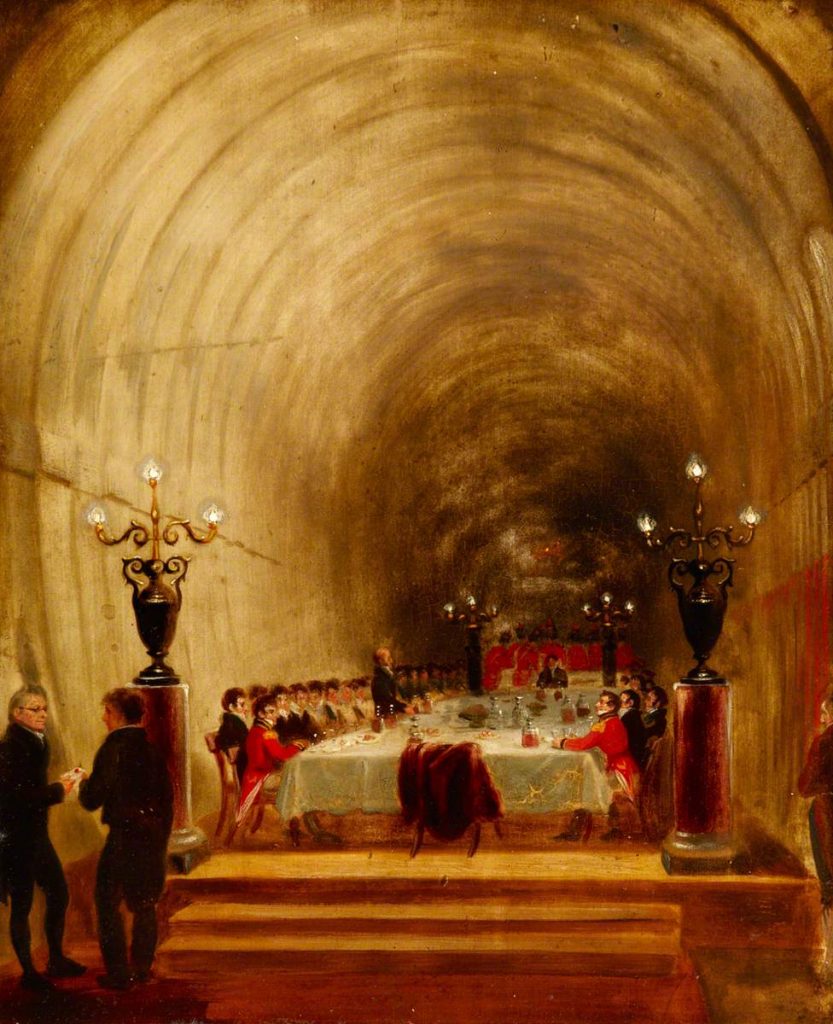An article from The Standard, published on Monday the 12th of November 1827, going into detail about the banquet in the Thames Tunnel on the Saturday before, 10th November 1827.
Content Notes:
Mr. Brunel / Mr Brunel sen. refer to Marc Brunel
Mr. Brunel jun. / J. Brunel refer to Isambard Kingdom Brunel
This is a historical document, the Brunel Museum wishes to be clear that sharing this article is not an endorsement of views contained therein.
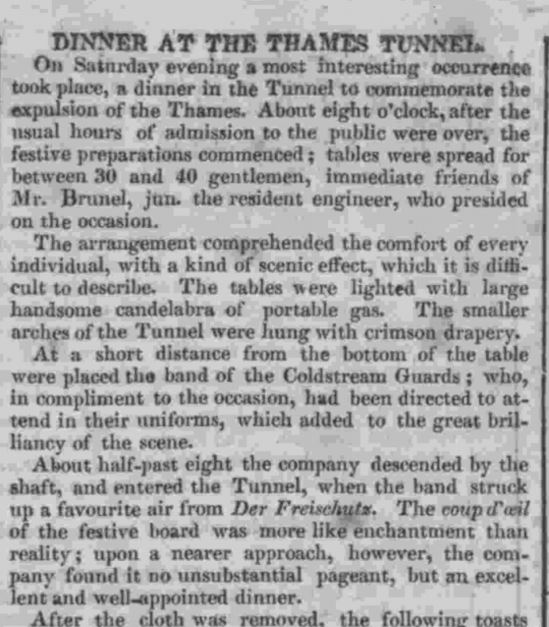
DINNER AT THE THAMES TUNNEL
On Saturday evening a most interesting occurrence
took place, a dinner in the Tunnel to commemorate the
expulsion of the Thames. About eight o’clock, after the
usual hours of admission to the public were over, the
festive preparations commenced; tables were spread for
between 30 and 40 gentlemen, immediate friends of
Mr. Brunel, jun. the resident engineer, who presided
on the occasion.
The arrangement comprehended the comfort of every
individual, with a kind of scenic effect, which it is diffi-
cult to describe. The tables were lighted with large
handsome candelabra of portable gas. The smaller
arches of the Tunnel were hung with crimson drapery.
At a short distance from the bottom of the table
were placed the band of the Coldstream Guards; who,
in compliment to the occasion, had been directed to at-
tend in their uniforms, which added to the great bril-
liancy of the scene.
About half-past eight the company descended by the
shaft, and entered the Tunnel, when the band struck
up a favourite air from Der Freischutz. The coup d’oeil
of the festive board was more like enchantment than
reality; upon a nearer approach, however, the com-
pany found it no unsubstantial pageant, but an excel-
lent and well-appointed dinner.

After the cloth was removed, the following toasts
were drunk, viz.- “The King” (four times four); tune,
“God save the King.” “The Duke of York” (in
silence.) “The Duke of Clarence and the Navy”
(three times three); tune, “Rule Britannia.” “The
Duke of Wellington (one of the noble proprietors) and
the Army” (three times three); air “See the con-
quering hero comes.”
In proposing the health of his Majesty, the chair-
man aptly observed that the health of our gracious
Sovereign had been drank in every clime; but hitherto
never under that river which carried over their heads
the wealth of nations into the wealthiest metropolis in
the world.
Mr. Bandinel then rose, and observed that it had
fallen to his lot to propose the health of an eminent in-
dividual known, he might say, through every part of
the world; but more especially known in the place
where he had now the honour of of addressing them. He
then proposed the health of Mr. Brunel.
Mr. Benjamin Hawes, jun., in the absence of the
chairman, returned thanks for Mr. Brunel, sen., who
was not present.
Mr. Beamish next proposed the “chairman and
Court of Directors.” He remarked particularly upon
the benefits which have arisen to the British nation
from the power of public companies, and more espe-
cially those which promoted undertakings at home like
the present; and he concluded by complimenting the
Board of Directors.
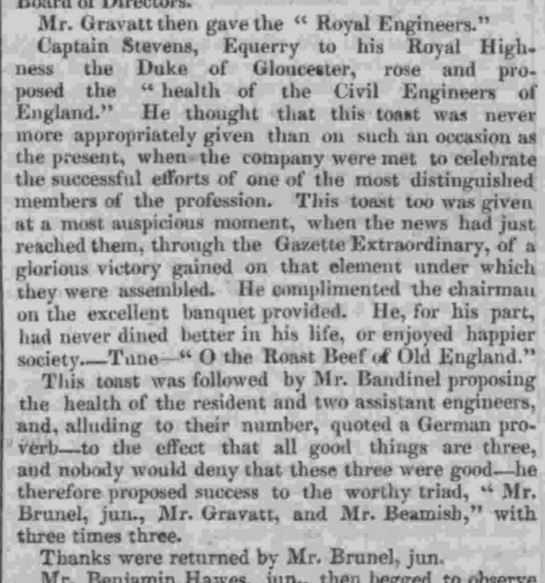
Mr. Gravatt then gave the “Royal Engineers.”
Captain Stevens, Equerry to his Royal High-
ness the Duke of Gloucester, rose and pro-
posed the “health of the Civil Engineers of
England.” He thought that this toast was never
more appropriately given than on such an occasion as
the present, when the company were met to celebrate
the successful efforts of of one of the most distinguished
members of the profession. This toast too was given
at a most auspicious moment, when the news had just
reached them, through the Gazette Extraordinary, of a
glorious victory gained on that element under which
they were assembled. He complimented the chairman
on the excellent banquet provided. He, for his part,
had never dined better in his life, or enjoyed happier
society. – Tune – “O the Roast Beef of Old England.”
This toast was followed by Mr. Bandinel proposing
the health of the resident and two assistant engineers,
and, alluding to their number, quoted a German pro-
verb – to the effect that all good things are three,
and nobody would deny that these three were good – he
therefore proposed success to the worthy triad, “Mr.
Brunel, jun., Mr. Gravatt, and Mr. Beamish,” with
three times three.
Thanks were returned by Mr. Brunel, jun.
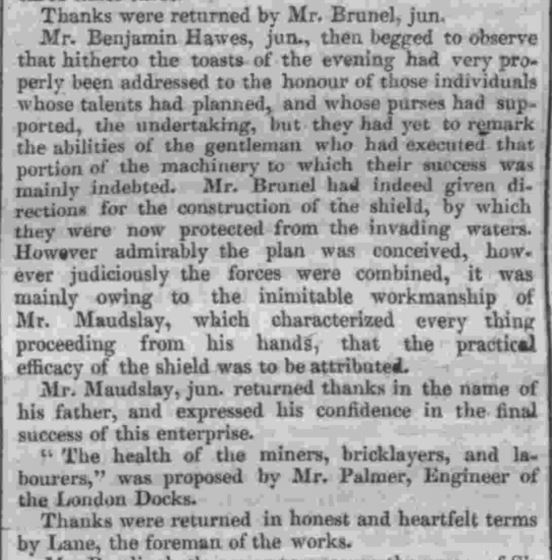
Mr. Benjamin Hawes, jun., then begged to observe
that hitherto the toasts of the evening had very pro-
perly been addressed to the honour of those individuals
whose talents had planned, and whose purses had sup-
ported, the undertaking, but they had yet to remark
the abilities of the gentleman who had executed that
portion of the machinery to which their success was
mainly indebted. Mr. Brunel had indeed given di-
rections for the construction of the shield, by which
they were now protected from the invading waters.
However admirably the plan was conceived, how-
ever judiciously the forces were combined, it was
mainly owing to the inimitable workmanship of
Mr. Maudslay, which characterized every thing
proceeding from his hands, that the practical
efficacy of the shield was to be attributed.
Mr. Maudslay, jun. returned thanks in the name of
his father, and expressed his confidence in the final
success of this enterprise.
“The health of the miners, bricklayers, and la-
bourers,” was proposed by Mr. Palmer, Engineer of
the London Docks.
Thanks were returned in honest and heartfelt terms
by Lane, the foreman of the works.
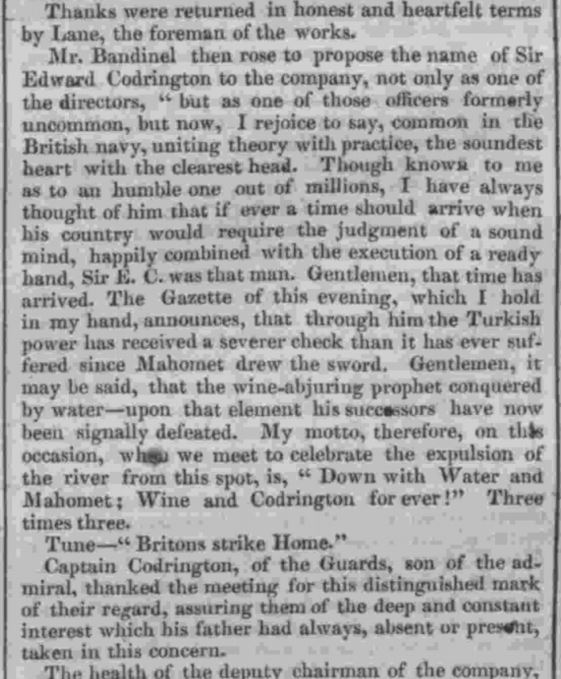
Mr. Bandinel then rose to propose the name of Sir
Edward Codrington to the company, not only as one of
the directors, “but as one of those officers formerly
uncommon, but now, I rejoice to say, common in the
British navy, uniting theory with practice, the soundest
heart with the clearest head. Though known to me
as to an humble one out of millions, I have always
thought of him that if ever a time should arrive when
his country would require the judgement of a sound
mind, happily combined with the execution of a ready
hand, Sir E. C. was that man. Gentlemen, that time has
arrived. The Gazette of this evening, which I hold
in my hand, announces, that through him the Turkish
power has received a severer check than it has ever suf-
fered since Mahomet drew the sword. Gentlemen, it
may be said, that the wine-abjuring prophet conquered
by water – upon that element his successors have now
been signally defeated. My motto, therefore, on this
occasion, when we meet to celebrate the expulsion of
the river from this spot is, “Down with Water and
Mahomet; Wine and Codrington for ever!” Three
times three.
Tune – “Britons strike Home.”
Captain Codrington, of the Guards, son of the ad-
miral, thanked the meeting for this distinguished mark
of their regard, assuring them of the deep and constant
interest which his father had always, absent or present,
taken in this concern.
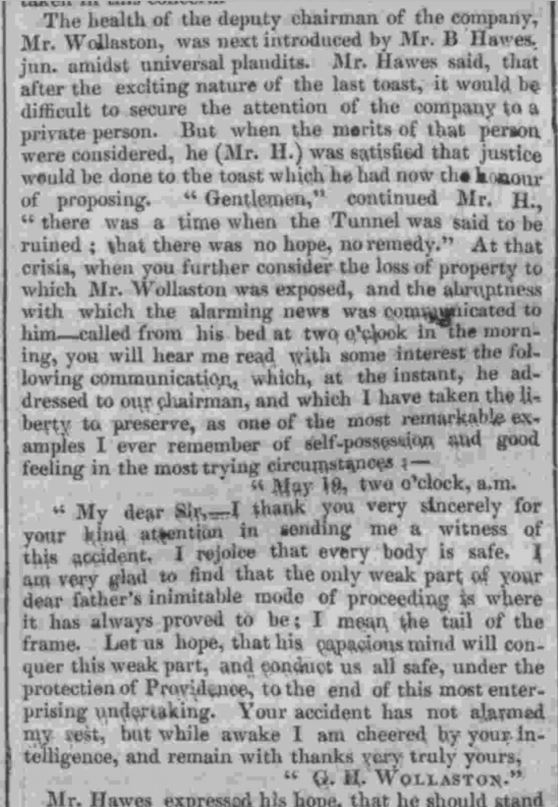
The health of the deputy chairman of the company,
Mr. Wollaston, was next introduced by Mr. B Hawes,
jun. amidst universal plaudits. Mr. Hawes said, that
after the exciting nature of the last toast, it would be
difficult to secure the attention of the company to a
private person. But when the merits of that person
were considered, he (Mr. H.) was satisfied that justice
would be done to the toast which he had now the honour
of proposing. “Gentlemen,” continued Mr. H.,
“there was a time when the Tunnel was said to be
ruined; that there was no hope, no remedy.” At that
crisis, when you further consider the loss of property to
which Mr. Wollaston was exposed, and the abruptness
with which the alarming news was communicated to
him – called from his bed at two o’clock in the morn-
ing, you will hear me read with some interest the fol-
lowing communication, which, at the instant, he ad-
dressed to our chairman, and which I have taken the li-
berty to preserve, as one of the most remarkable ex-
amples I ever remember of self-possession and good
feeling in the most trying circumstances: –
“May 19, two o’clock, a.m.
“My dear Sir, – I thank you very sincerely for
your kind attention in sending me a witness of
this accident. I rejoice that every body is safe. I
am very glad to find that the only weak part of your
dear father’s inimitable mode of proceeding is where
it has always proved to be; I mean the tail of the
frame. Let us hope, that his capacious mind will con-
quer this weak part, and conduct us all safe, under the
protection of Providence, to the end of this most enter-
prising undertaking. Your accident has not alarmed
my rest, but while awake I am cheered by your in-
telligence, and remain with thanks very truly yours,
“G. H. WOLLASTON.”
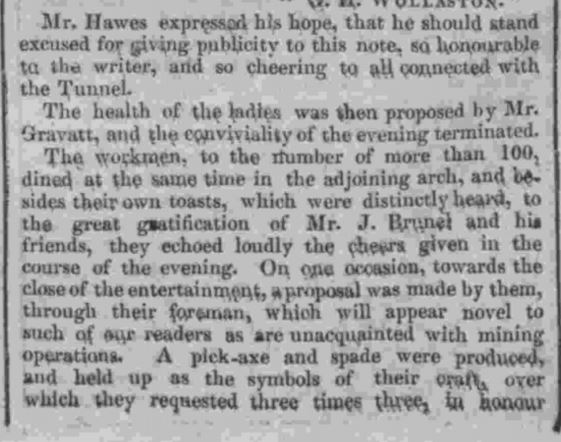
Mr. Hawes expressed his hope, that he should stand
excused for giving publicity to this note, so honourable
to the writer, and so cheering to all connected with
the Tunnel.
The health of the ladies was then proposed by Mr.
Gravatt, and the conviviality of the evening terminated.
The workmen, to the number of more than 100,
dined at the same time in the adjoining arch, and be-
sides their own toasts, which were distinctly heard, to
the great gratification of Mr J. Brunel and his
friends, they echoed loudly the cheers given in the
course of the evening. On one occasion, towards the
close of the entertainment, a proposal was made by them,
through their foreman, which will appear novel to
such of our readers as are unacquainted with mining
operations. A pick-axe and spade were produced,
and held up as the symbols of their craft, over
which they requested three times three, in honour
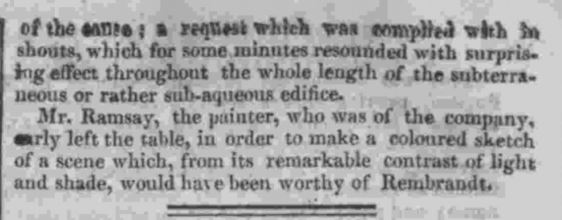
of the same; a request which was complied with in
shouts, which for some minutes resounded with surpris-
ing effect throughout the whole length of the subterra-
neous or rather sub-aqueous edifice.
Mr. Ramsey, the painter, who was of the company,
early left the table, in order to make a coloured sketch
of a scene which, from its remarkable contrast of light
and shade, would have been worthy of Rembrandt.

